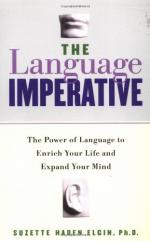|
This section contains 3,130 words (approx. 11 pages at 300 words per page) |

|
Both scholars and communicators operate on the premise that language is structured in an orderly fashion. An alternative view is that language is organized in a random fashion. Clearly, however, communicators treat language as tightly structured. A source of debate centers around whether the structure of language is innate in humans or is learned through socialization processes.
Research History
Noam Chomsky (1957, 1965) suggests that children are born with knowledge of a universal grammar (i.e., a set of principles that are common to all languages) that can be applied to any language. This fundamental knowledge of languages is an individual's linguistic competence. The ability to use a given language in a particular situation is an individual's linguistic performance. Scholars can use linguistic performance as a resource for inferring the character of linguistic competence.
Chomsky observed that while there are a fixed number of phonemes (i.e., meaningfully...
|
This section contains 3,130 words (approx. 11 pages at 300 words per page) |

|


